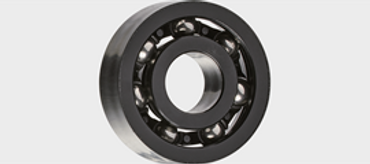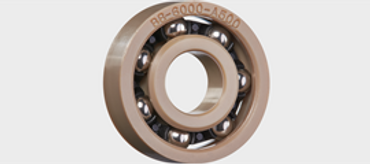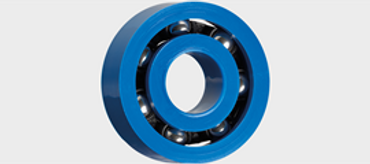xiros® deep groove ball bearings
Single-row xiros® deep groove ball bearings are plastic ball bearings according to DIN 625 and belong to the family of rolling bearings. What are deep groove ball bearings anyway? For the most part, they are there to absorb radial loads, usually with high rotational speeds. In exceptional cases, they are also suitable for the absorption of small axial forces.
This is made possible by the rolling elements that lie close against the running grooves of the bearing.Like other rolling bearings, our lubrication-free and low-maintenance plastic deep groove ball bearings consist of four components. However, the two races - consisting of inner and outer race - are offered in different plastic versions to meet a wide range of customer requirements. The bearing cage must also be adapted to the respective ambient conditions. Our ball bearings are fitted with stainless-steel, glass or polymer balls.
Would you like more information about the xiros® plastic ball bearing range? Our experts will be happy to get in touch with you.
Visit the shop
Our deep groove ball bearing materials
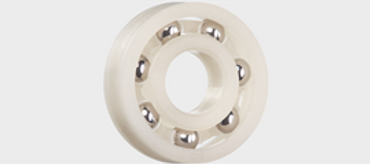
xirodur C160
- Excellent chemical resistance
- Low absorption of different media
- Low-cost material compared to xirodur A500
Visit the shop
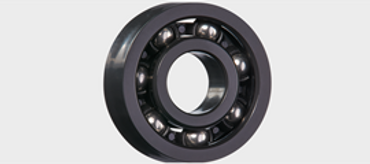
xirodur F180
- ESD-suitable material (antistatic)
- Supports the removal of undesired electrostatic charge
Visit the shop
Suitable deep groove ball bearings in just a few steps
With just a few details about your application, our online tool provides you with an overview of all suitable plastic deep groove ball bearings. In addition, you will find out the expected service life of the ball bearing based on your application data.
Find and order the right deep groove ball bearing now
How are deep groove ball bearings constructed?
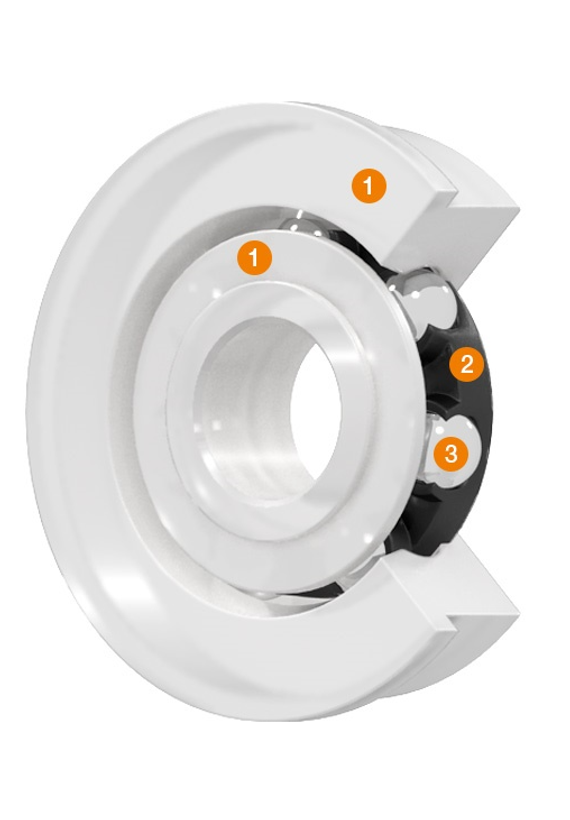
1. Outer and inner races
The suitability of a xiros ball bearing according to DIN 625 is decisively determined by the materials of the two races. These are made from tribopolymers to maximise service life and minimise coefficients of friction. There are diverse materials to choose from. They allow different values for application temperature, media resistance and price.
2. The cage
The material of the bearing cage must also match the application. These materials are also very different in terms of chemical resistance and temperature. Within the xiros bearing product range, the cages are already perfectly matched to the materials of the inner and outer races.
3. The balls
The ball materials differ most clearly. In addition to stainless steel, glass or plastics are used. This produces a large difference in mass, which in turn affects quiet operation, weight and media resistance. Stainless-steel balls are cost-effective and resistant to chemicals but are also the heaviest type. Glass balls should be selected when metal-free material is important. They are also very resistant to chemicals and have a moderate weight. Polymer balls have decisive advantages in terms of weight and quiet running behaviour. Depending on the plastic, polymer balls also have excellent chemical resistance.
The suitability of a xiros ball bearing according to DIN 625 is decisively determined by the materials of the two races. These are made from tribopolymers to maximise service life and minimise coefficients of friction. There are diverse materials to choose from. They allow different values for application temperature, media resistance and price.
2. The cage
The material of the bearing cage must also match the application. These materials are also very different in terms of chemical resistance and temperature. Within the xiros bearing product range, the cages are already perfectly matched to the materials of the inner and outer races.
3. The balls
The ball materials differ most clearly. In addition to stainless steel, glass or plastics are used. This produces a large difference in mass, which in turn affects quiet operation, weight and media resistance. Stainless-steel balls are cost-effective and resistant to chemicals but are also the heaviest type. Glass balls should be selected when metal-free material is important. They are also very resistant to chemicals and have a moderate weight. Polymer balls have decisive advantages in terms of weight and quiet running behaviour. Depending on the plastic, polymer balls also have excellent chemical resistance.
- ES stainless steel (1.4401)
- GL glass (soda-lime glass)
- PAI plastic "PAI"
- POM plastic "POM"
Other types:
- Convex rollers which can run directly on a profile
- Profile rollers, e.g. for thread/cable guidance
- Spherical thrust bearings and ball slewing connections to absorb axial loads
- Multi-axis bearings for linear and radial movements
- Fixed flange bearings, such as for installation in tube ends (also for guide rollers)
- Double row bearings to absorb higher forces
Where are deep groove ball bearings used?
Despite being used under water, the used plastic deep groove ball bearings function without failures. The reason is freedom from lubrication and corrosion resistance. Conventional metallic rolling bearings were out of the question, as they rely on lubricating greases.
Go to application
For mechanical drive technology for a pellet stove, the customer needed an alternative to metal, as it seized up immediately and was too loud during operation. The solution: Deep groove ball bearings made of xirodur A500. These even allow short-term temperature applications of up to 315°C, are much quieter and 100% lubrication-free.
Go to application
The igus technical ball bearing wiki
Would you like to find out more about radial deep groove ball bearings in general? Then take a look at our information section, where you will find answers to many technical questions relating to ball bearings, including:- When should I change my ball bearing?
- How do the balls get into the ball bearing?
- Deep groove ball bearings - tolerances and measurement recommendations
Technical ball bearing wiki
